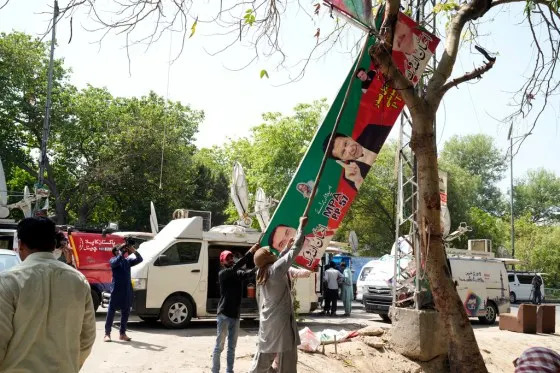
Municipal workers remove Imran Khan posters in Lahore, Pakistan, May 20, 2023 – Photo K.M. Chaudary/AP
A Jailed Imran Khan Looms over Pakistan’s Upcoming Elections
By Charlie Campbell
Zulfi Bukhari was transiting at Dubai International Airport when he got a call from Imran Khan telling him not to come back to Pakistan. It was May 9 and Khan had just been arrested at Islamabad’s High Court on corruption charges. Although he was quickly released, the cricketer-turned-populist prime minister felt the dragnet closing.
“He told me, ‘The minute you land they're going to arrest you at the airport,’” recalls Bukhari, a former Minister of State under Khan. “‘So, you're more useful to me outside.’”
It proved invaluable advice. Bukhari instead returned to London and avoided a crackdown that has since decimated Khan’s Pakistan Tehreek-e-Insaf (PTI) party. Khan, 70, was arrested again on August 5 and sentenced to three years in prison and five years disqualified from politics over the alleged sale of state gifts. More than 13,000 PTI activists and supporters have since been detained, according to Bukhari citing party records TIME has been unable to independently verify, while a media blackout means Khan’s name cannot even be uttered on television.
Meanwhile, dozens of PTI officials have been intimidated into resigning their posts , gone into hiding, or hit with charges ranging from sedition to terrorism—including Bukhari, who was born in London’s leafy Hampstead neighborhood and built a thriving real estate business in the UK before entering politics. “Imagine when I go into my bank and they see terrorism charges and arrest warrants out for me,” he says with a wry chuckle. “I mean, it’s not helpful.”
On Thursday, Pakistan’s Election Commission announced that long-waited elections will finally happen in January following the remarking of constituencies based on new census data. The Asian Development Bank this week highlighted the need for polls to boost confidence in Pakistan’s ailing $350 billion economy, which is suffering from high inflation, torpid growth, and a weak rupee.
But the question remains whether any ballot can be free and fair with Pakistan’s most popular party routed and its leader wallowing in a fetid nine-by-11-foot jail cell. Election results are rarely universally accepted at the best of times in Pakistan and accusations of bias could sow further disruption just as the nation struggles to stay on a rigid stabilization deal negotiated under a $3 billion International Monetary Fund bailout.
“What is happening is the biggest pre-poll rigging ever in the history of Pakistan,” says Bukhari. “What free and fair elections can we have when the largest grassroots party is being dismantled, not allowed onto the streets, not allowed to wave their flags?”
The precipitous fall of Imran Khan —elected as prime minister on an anti-graft ticket in 2018—has been astonishing even for Pakistan. The nuclear-armed South Asian nation of 230 million has been ruled by generals for half its history and no elected leader has ever completed a full term. Each of Pakistan’s past five prime ministers have faced convictions or imprisonment.
Pakistan’s powerful armed forces continue to play kingmaker and it was Khan’s fraying relationship with the generals that sparked his ouster in an April 2022 no-confidence vote . Since then, he has been hit by more than 180 charges, including leaking state secrets, corruption, treason, and organizing violent protests. In August 29, Pakistan’s supreme court suspended his latest corruption conviction and granted bail—though the multitude of other charges against Khan meant he was not released. On Thursday, he was summoned to court on separate charges that he engaged in an “un-Islamic marriage.”
“The military does not want him to have the opportunity to contest elections,” says Michael Kugelman, the director of the South Asia Institute at the Wilson Center think-tank. “Because if it's not rigged, there's a very good chance that the PTI could still win.”
Yet despite broad interest in seeing democracy thrive in Pakistan, the muted international reaction to Khan’s plight has been telling. The playboy turned devout Muslim alienated many by repeatedly accusing the US of plotting his ouster. In addition, his decision to visit Vladimir Putin on the eve of his invasion of Ukraine was widely condemned. Asked by TIME in March about this trip, Khan shrugged that it simply was to arrange cheap oil imports, saying that his “priority was how to help people come out of poverty.”
But this kind of pragmatism applied to foreign policy Khan refused to employ in domestic affairs—from goading the military, whom he sardonically dubbed “neutrals” in light of their persistent meddling, to pursuing corruption charges against his political opponents. (Although, insists Bukhari, all were pre-existing charges rather than brought under Khan’s government.)
Much hinges on January’s polls. With Khan sidelined, the other main contenders are outgoing Prime Minister Shehbaz Sharif, brother of three-time premier Nawaz Sharif—Khan’s longtime nemesis—and Bilawal Bhutto Zardari, the 34-year-old son of assassinated former Prime Minister Benazir Bhutto. Whether either can truly claim a popular mandate is a big question. In a Gallup poll conducted in February, neither received much backing, while 61% of respondents viewed Khan favorably. But any political comeback by Khan rests on somehow putting his bad blood with the generals behind them.
“The Chief of Army Staff is the most powerful man in the country,” says Bukhari. “Imran Khan is the most popular politician. The two must sit around a table and get along for the sake of everyone.” – Courtesy TIME

